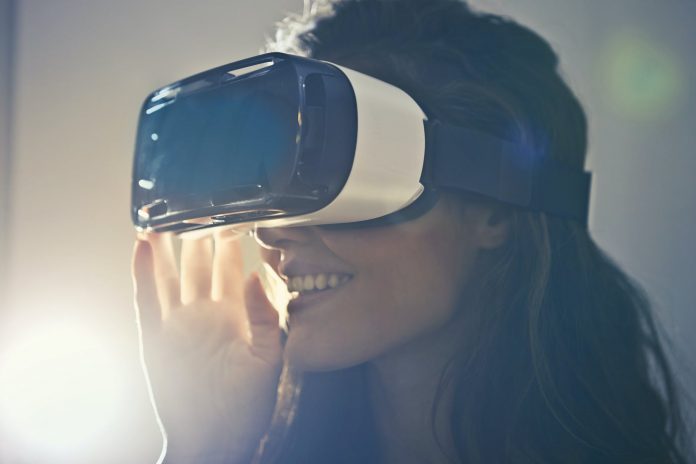
In the digital era, virtual reality is one of the biggest emerging technology trends evolving continuously. From real-estate to hospitality, it is popping up in more and more places. Many industries are profoundly benefiting their businesses with the numerous opportunities it provides. The hospitality industry is no exception as it offers a potential customer the digital transport experience to a hotel with virtual reality.
What is Virtual Reality?
Virtual reality is a computer technology that creates realistic images, sounds, and sensations with a three-dimensional virtual environment. One needs to make use of a headset that enables to projects an image in a digital environment from a full 360-degrees.
Built-in headphones consist of audio and traditional joysticks that allow users to interact virtually and manipulate the visible images. Some joysticks also offer vibrations while interacting with the virtual objects in a VR simulation.
The concept of virtual reality has existed since the 1930s. But advanced virtual reality headsets have become popular in more recent times when many leading brands like Google, Facebook, and Samsung have invested in this technology.
How is Virtual Reality changing the Hospitality Industry?
Today, VR technology is ubiquitously influencing a variety of markets; the hospitality industry embraces this technology globally. Holding a device and visualizing different amenities of hotels add life to various elements and offer an immersive experience. Smart technology & device, innovative thinking, and proactive approach all we required to craft the perfect escape hospitality experience.”
With the advancements in VR technologies, its implementation continues to impress consumers globally. As a result, this evolving technology is envisioned and provides benefits to end-users in the hospitality and tourism industry.
The following analysis highlights the role and importance of AR technology for the Hospitality and Tourism industry.
- Effective Planning and Suitable Management
AR technology has widened in terms of implementing effective planning. VR devices provide realistic, smooth, and detailed navigation of hotels inside and outside for tourists to help them in making a decision. In tourism, VR technologies, allow tourists to experience bird’ s-eye views of their destination to be visited. For a successful implementation of virtual reality to enhance user experience one need to focus on the effective planning and management.
- Effective Entertainment Tool
VR technology has evolved to a greater height since 1962, with the introduction of the “Sensorama Simulator.” This technology provided a virtual experience of driving a motorcycle, including realistic movement, sound, and airflow to people. It has been used in various theme parks like Disneyland to entertain kids with virtual rides, flight simulators, etc. Nowadays, 3D and 4D movies are also introduced in the theatres worldwide.
The world is different, and things have changed, the internet being one of the main reasons for most of the changes, even in the gaming industry. Currently, gaming is on a zone of its own where there is an interaction of humans with other humans, but on video games, allow me to put it in simple terms, “virtual gaming.” Now we can easily enjoy a game blackjack with our buddies without even having to meet physically.
- Virtual Attractions
New VR travel tourism experiences can also feature in existing applications by simply animating them. It helps create a digital environment and digital content that can be added or uploaded on demand according to the customer’s requirement and even used for other marketing purposes.
- Interactive Dining Experience
Fantastic food and entertainment are most valuable when it comes to the hospitality industry. Virtual reality technology makes it possible to experience a virtual tour of the restaurant and allow in making diving decisions using the virtual menus available. It also incorporates other attractive features like accessing free, reservation options that will enable the visitors to try new dining experiences.
- Real-Time and Reliable Navigation
sometimes landing in a new place develops frustration as well as challenges for the visitor. This is where VR helps elevate the navigation maps with digital elements like arrows and other helpful information to the map. This technology augments the feeling with clear directions to follow and ensuring a safe and comfortable traveling to the desired destination.
- Booking Rooms
Virtual reality booking processes are possible today because of the evolution of VR technology. It is one of the best creations that has made the booking experience seamless. This has been implemented by brands like Amadeus, Kimpton, and hotels like Marriot. Virtual reality headset made it easier for guests to look for flights, compare hotel prices, and book.
VR technology allows potential guests to survey the rooms before booking them. The guests can virtually visit the rooms to check with size as well as floor plans. These guests may further request the hotel to upgrade or change a suite by looking at providing amenities, the mesmerizing view outside the window, and the contented spaciousness around them.
The potential for this is still yet to fully explore. As for now, the customer is taking full advantage of this VR booking process that allows customers to explore virtual hotel rooms, experience local sights, and room booking without any hassle.
- Exploring the property
Now you can explore the hotel virtually without any need for website images and paper brochures. Many hotels even provide a virtual tour of its rooftop, herb garden, or spa and fitness area that enhances the customer experience. In the past years, many leading hotels and resorts like Marriott Hotels and Resorts, Holiday Inn Express, Shangri-La Hotels, and Resorts and Airbnb have used VR tech to enhance the guest experience in some way.
A few years back, Marriott Hotels & Resorts introduced a VR-based guest service, dubbed VRoom Service, to deliver a virtual reality experience to guests to their rooms. VRoom Service collaborated with Samsung to offer guests Samsung Gear VR headset and accompanying headphones.
Is VR the Future of Guest Experience?
Since virtual reality is still in its infancy, it is hard to conclude whether it will be the best fit for hotels. The cost of investing is also one of the primary concerns regarding virtual experiences as we are still unsure about the future of this innovation. However, with VR headsets becoming increasingly popular, this technology is sure to change the industry’s future significantly. This is why the hospitality industry must know how to use VR to elevate the guest experience.
The right use of virtual reality at the right time for the right customer is surely enhanced guest experience and exceed the expectations of today’s traveler. One way to learn more about these expectations is with The Strategic Guide to virtual reality in travel and tourism. It explores how VR technology satisfies the modern traveler’s ever-changing needs.










